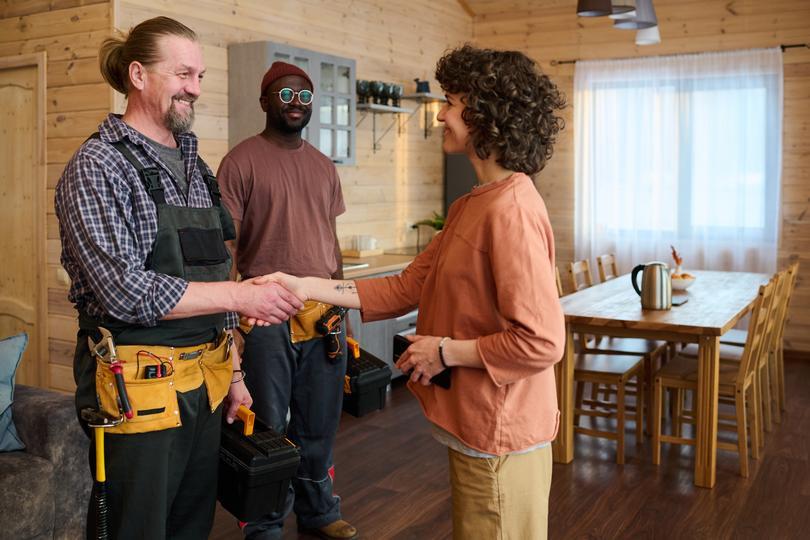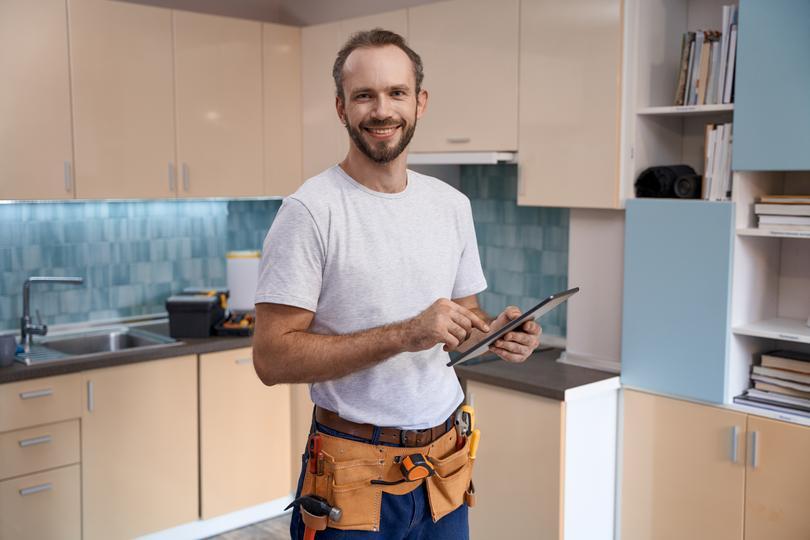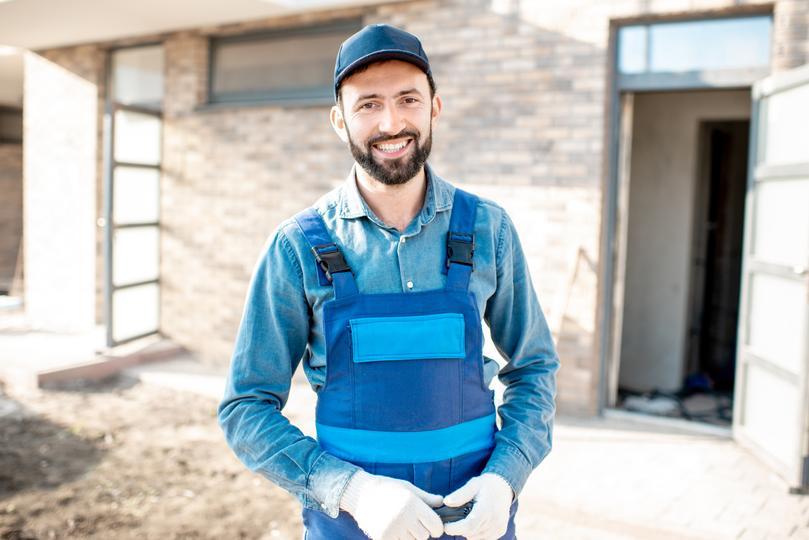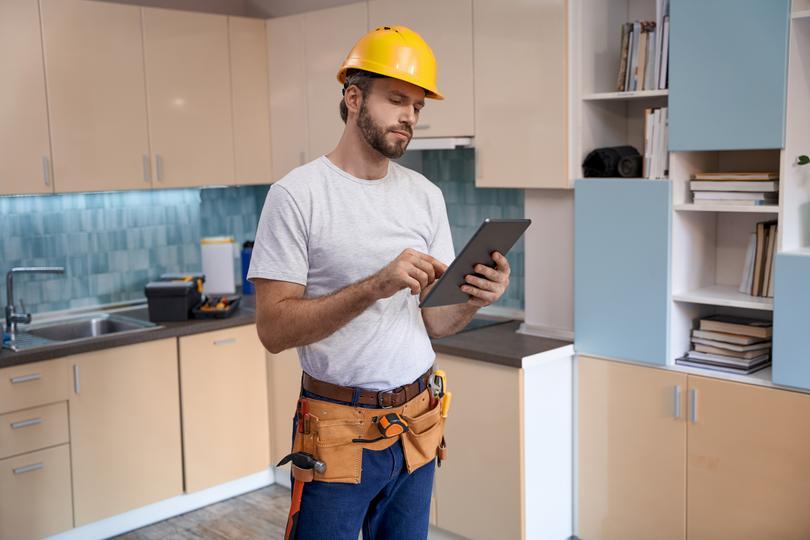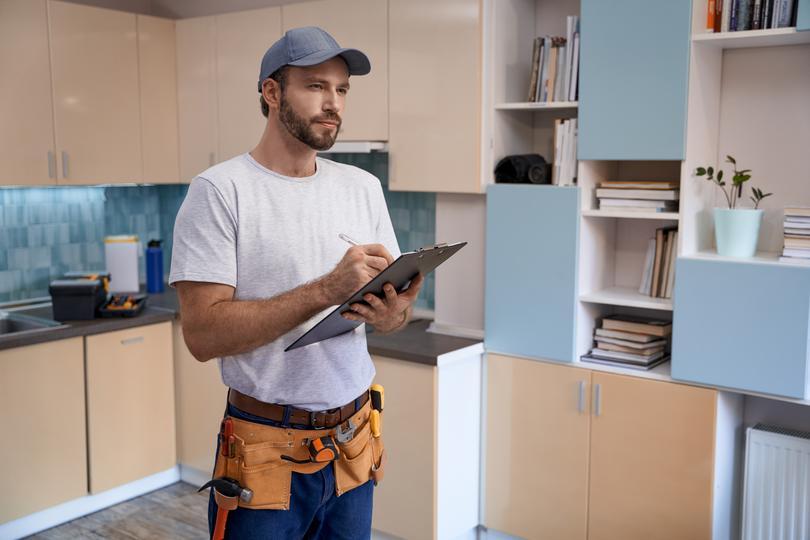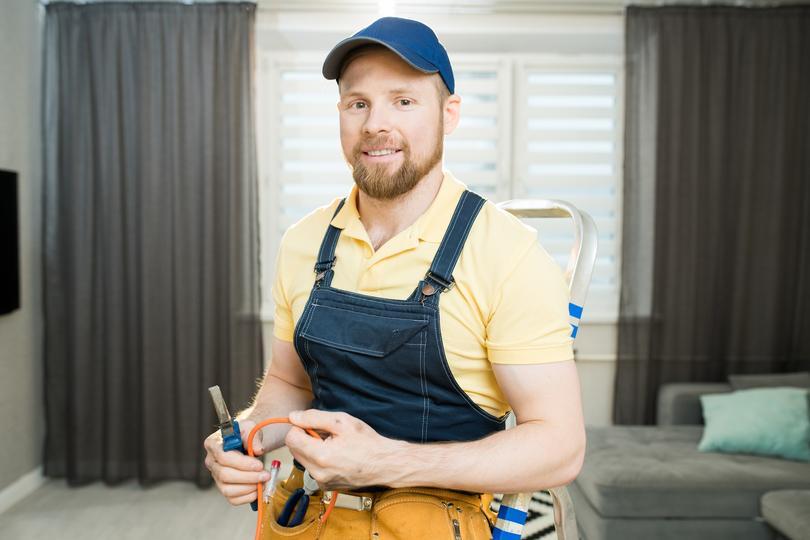Explore Aging-in-Place Modifications - Secure Comfort & Safety at Home
Empower Your Independence With A Reliable Expert in Aging-in-place Remodeling
Connect with professional remodelers through Remodelyng.com to customize your home for safe living. Receive up to 3 free quotes and choose the best solution suited to your needs.

Begin Your Home Transformation
Utilize Remodelyng.com to easily compare and find aging-in-place modification services that boost your living quality, ensuring your home evolves with your needs.
Find top-tier remodeling companies to enhance your living space. Explore services for whole home, kitchen, bathroom renovations, and more with expert craftsmansh
Transform your kitchen into a masterpiece with top-rated remodeling companies. Discover custom designs, luxury finishes, and smart kitchen solutions.
Upgrade your bathroom with the best in the business. Explore spa-like renovations, eco-friendly fixtures, and modern design solutions.
Expand your living space with premium home addition services. From extra bedrooms to sunrooms, get custom solutions tailored to your needs.
Transform your entire home with our comprehensive renovation services. From design to execution, experience seamless integration of style and functionality.
Elevate your home’s curb appeal with our exterior remodeling services. From siding and windows to roofing, create a lasting first impression.
Create your perfect outdoor living space with our deck and patio construction services. Tailored designs meet exceptional craftsmanship.
Maximize your home’s potential with our basement finishing and remodeling services. Turn unused space into your new favorite place.
Embrace sustainability with our energy-efficient remodeling services. From solar panels to green materials, enhance your home’s efficiency and comfort.
Upgrade your living with smart home automation. Control lighting, security, and entertainment systems seamlessly for enhanced comfort and convenience.
Add a personal touch to your home with custom carpentry and built-ins. From bookshelves to closets, get bespoke solutions that fit your style and needs.
Elevate your home with our flooring installation services. Choose from high-end hardwood, marble, or custom tiles to create a stunning foundation for your space.
Preserve the past and embrace the future with our historic home renovation services. Specializing in revitalizing heritage homes with a touch of modern convenien
Enhance your outdoor living space with our professional hardscaping services. From patios to walkways, our expert team creates beautiful, durable outdoor areas.
Ensure your home is safe and secure with our high-tech security systems installation services. From advanced surveillance to smart locks, enjoy peace of mind wit
Enhance your home’s energy efficiency and aesthetic appeal with our window and door replacement services. Choose from a wide range of stylish and durable options
Illuminate your home with custom lighting solutions that blend functionality and design. From LED upgrades to automated lighting systems, light up your space you
Create the ultimate entertainment space with our home theater installation services. Experience cinema-quality sound and visuals in the comfort of your home.
Enhance your outdoor living spaces with our outdoor lighting and electrical system services. From garden lights to integrated outdoor entertainment systems, make
Transform your outdoor space into a serene oasis with our custom water feature installations. From fountains to koi ponds, add a touch of tranquility to your hom
Achieve the perfect indoor environment with our advanced climate control systems. Enjoy tailored temperature and humidity settings for ultimate comfort all year
Enhance your home’s energy efficiency with our eco-friendly insulation solutions. From spray foam to sustainable materials, reduce your carbon footprint while sa
Ensure your home is protected with our roof replacement and repair services. From leak repairs to complete roof overhauls, our experts deliver quality workmanshi
Maximize your home’s potential by transforming your attic into a functional living space. Whether it’s a new bedroom, office, or playroom, our attic remodeling s
Create the ultimate outdoor living experience with our custom design and construction services. From kitchens to fire pits, enjoy your outdoor space to the fulle
Make your home accessible for everyone with our handicap remodeling services. From ramps to accessible bathrooms, we ensure your space meets ADA standards.
Create a productive and stylish home office space with our remodeling services. From ergonomic designs to custom storage, work from home in comfort and style.
Add value and functionality to your home with a custom pool house. Perfect for entertaining, changing, or simply relaxing by the poolside.
Transform your garage into more than just a place for parking. Our garage remodeling services can turn it into a workshop, gym, or additional living space, tailo
How it works?
Our process guarrantees that you always get afair and competitive quote. Say goodbye to overbilling!

- Submit an Enquiry Describing Your Project
- Begin by submitting an enquiry for your Aging-in-Place Modifications needs on Remodelyng.com, ensuring that all relevant project specifics are covered to match you accurately with skilled contractors.
- Experts Match You With Qualified Contractors
- Our Remodelyng.com specialists will assess your project details and then invite the most adequate contractors, who have a proven track record of success on Aging-in-Place Modifications projects, to submit a competitive quote for your consideration.
- Contractors Offer Their Best Quotes
- Selected pros, aware of the competition and keen to win your job, will put forward fair and competitive quotes, ensuring you get the best value for your Aging-in-Place Modifications project.
- Review, Compare, and Choose
- You'll receive these quotes along with access to the contractors' profiles, including reviews, insurance details, and license information. This comprehensive data allows you to make an informed decision, picking the contractor that best fits your project's requirements and budget, based on factual evidence rather than intuition.
Why Choose Remodelyng.com?
At Remodelyng.com, we're committed to making your Aging-in-Place Modifications journey seamless and rsik-free. From the first click to the completion of your project, our team is here to support you every step of the way.

- No Cost, No Obligation
- Submitting a project request on Remodelyng.com is absolutely free, and you're under no obligation to proceed. We understand the importance of exploring your options before making a decision.
- Multiple Quotes
- Receive up to 3 competitive quotes from our network of trusted companies. We make it easy for you to compare options and ensure you're getting the best deal for your project.
- Best Price Guarantee
- Our platform is designed to help you always find the best price for essential home improvements. With a wide range of contractors, you're sure to get a great deal for high-quality work.
- Quality and Trust
- Choose from a selection of top-rated professionals vetted for quality and reliability. Our rigorous selection process ensures that you're matched with the best contractors who have a proven track record of success.
- Comprehensive Services
- From initial consultation to the final touches, Remodelyng.com offers a wide range of services to cover all aspects of your remodeling project. Whether it's a kitchen upgrade, bathroom renovation, or a full home remodel, we have the expertise to support your vision.
- Instant Booking & Convenience
- With Remodelyng.com, you can book your project instantly online. No more waiting for callbacks or dealing with multiple contractors. Our streamlined process saves you time and hassle, making home improvement projects as straightforward as possible.
Aging in Place Modifications Comprehensive Guide
Our detailed checklists will support you through the execution of aging in place modifications, ensuring a safe home environment for the elderly.
Step 1
Planning Aging in Place Modifications
How Do I Start Planning for Aging in Place Modifications?
Starting your aging in place modifications begins with strategic planning. Here’s a blueprint to ensure your home is prepared for the future.
- Assessing Needs
- Evaluate the current needs of the household, considering mobility, accessibility, and safety, to identify key areas requiring modification.
- Budgeting Carefully
- Create a realistic budget that covers all modifications, including potential unseen expenses, to ensure financial readiness for the project.
- Researching Solutions
- Explore various aging in place solutions, focusing on technology, equipment, and design innovations that promote independence and safety.
- Prioritizing Projects
- Identify and prioritize modifications based on immediate needs, potential impact, and budget constraints to create a phased approach to implementation.
- Consulting Experts
- Engage with aging in place specialists, occupational therapists, or certified aging in place professionals (CAPS) for expert advice on making your home more accessible.
- Planning for Future Needs
- Consider long-term scenarios and how modifications can adapt to changing needs over time, ensuring the home remains safe and comfortable.
- Exploring Funding Options
- Investigate grants, loans, and insurance coverage options that may help finance the modifications without overly straining personal finances.
- Securing Permits
- Check local regulations and secure any necessary permits for construction or modification work to ensure compliance and avoid legal issues.
- Creating a Timeline
- Develop a detailed project timeline, considering the best times for construction and any accommodations needed during the modification process.
- Preparing for Disruptions
- Plan for temporary disruptions to daily life during construction, arranging alternative solutions for major inconveniences.
Step 2
Selecting the Right Contractor for Aging in Place Modifications
How Do I Choose the Right Contractor for Aging in Place Modifications?
Choosing a skilled contractor is crucial for implementing effective aging in place modifications. Follow these steps to ensure a good match.
- Verifying Specialization
- Look for contractors who specialize in aging in place modifications or have CAPS certification, indicating they understand the unique needs of such projects.
- Checking References
- Ask for and follow up on references from past clients who have undergone similar modifications to gauge satisfaction and work quality.
- Evaluating Past Work
- Review the contractor’s portfolio of aging in place projects to assess their capability and experience in making homes safer and more accessible.
- Discussing Your Specific Needs
- Have in-depth conversations with potential contractors about your specific aging in place needs, ensuring they offer customized solutions rather than a one-size-fits-all approach.
- Comparing Bids
- Request detailed bids from several contractors to compare costs, timelines, and the scope of work. Look beyond price to consider value and expertise.
- Understanding Contract Details
- Carefully review contracts for clarity on project scope, cost, timeline, and warranty information. Ensure you are comfortable with all terms before signing.
- Clarifying Communication Processes
- Establish clear lines of communication for ongoing project updates, changes, and questions. A good contractor should be easily accessible and responsive.
- Confirming Insurance and Licenses
- Ensure the contractor has the necessary insurance coverage and licenses to perform aging in place modifications in your area, protecting you from potential liability.
- Setting Expectations
- Clearly define your expectations for the project, including finish quality, safety measures during construction, and any specific requirements related to aging in place needs.
- Finalizing Your Choice
- After thorough research and consideration, choose the contractor who best meets your needs, offers a fair price, and demonstrates a strong understanding of aging in place modifications.
Step 3
Preparation Before Starting Aging in Place Modifications
How Do I Prepare for the Start of Aging in Place Modifications?
Proper preparation ensures the modification process is as smooth and stress-free as possible. Here’s what to do before construction begins.
- Reviewing Plans with Contractor
- Go over the project plans with your contractor one last time to ensure all needs are addressed and there are no misunderstandings about the work to be done.
- Securing Personal Belongings
- Secure or remove valuables and fragile items from work areas to prevent damage. Consider off-site storage for larger items if needed.
- Setting Up Temporary Spaces
- If modifications impact essential rooms like bathrooms or kitchens, set up temporary alternatives to minimize inconvenience during the project.
- Establishing Safety Protocols
- Discuss and establish safety protocols with the contractor, especially if the household includes elderly individuals, to ensure their safety during construction.
- Arranging for Possible Relocation
- For extensive modifications, consider whether a temporary relocation is necessary for the safety and comfort of elderly residents.
- Documenting Pre-Modification Condition
- Take detailed photos or videos of your home before modifications begin to document its condition and assist in any potential future disputes.
- Confirming Project Schedule
- Confirm the project schedule with your contractor, including start dates, significant milestones, and anticipated completion dates, to plan accordingly.
- Notifying Neighbors
- Inform neighbors about the upcoming modifications, especially if you anticipate noise, dust, or parking disruptions, to maintain good relations.
- Preparing for Dust and Noise
- Take measures to minimize the impact of dust and noise, such as setting up dust barriers and designating quiet hours, if necessary.
- Finalizing Details
- Ensure all details, including material selections and design choices, are finalized with the contractor to prevent delays once construction starts.
Step 4
Wrapping Up Aging in Place Modifications
What Are the Final Steps After Completing Aging in Place Modifications?
After modifications are complete, these steps will help ensure the project meets your expectations and your home is ready for safer, more accessible living.
- Conducting a Final Walkthrough
- Inspect the modifications with your contractor to ensure all work is completed to your satisfaction and addresses all agreed-upon aging in place needs.
- Addressing Any Issues
- Identify and list any unresolved issues or concerns during the walkthrough for immediate attention by the contractor.
- Completing Final Payments
- Finalize payments once you are satisfied with the work and all issues have been resolved, ensuring all contractual obligations are met.
- Collecting Warranty Information
- Gather all warranty information for materials and workmanship, storing them in a safe place for future reference.
- Reviewing Maintenance Instructions
- Understand the maintenance requirements for new installations or modifications to ensure their longevity and performance.
- Updating Home Insurance
- Consider updating your home insurance policy to reflect the value added through modifications, ensuring adequate coverage.
- Organizing Project Documentation
- Keep all project-related documentation, including contracts, permits, and receipts, organized for easy access and future reference.
- Evaluating the Modifications
- Assess the impact of the modifications on daily living and independence, noting any areas for future improvement or adjustment.
- Providing Contractor Feedback
- Offer feedback to your contractor, sharing your experience to help them improve and providing valuable insights for future clients.
- Celebrating Your Enhanced Home
- Acknowledge the completion of your aging in place modifications by enjoying the new levels of comfort and accessibility in your home.
Aging-in-Place Modifications Ideas
Need Some Inspiration?
Explore our carefully curated gallery featuring trendy and stylish Aging-in-Place Modifications ideas, designed to inspire and guide your renovation choices.
How much does Aging-in-Place Modifications costs?
More than a marketplace
We Are Your Closest Ally
Our hand-picked 5-stars contractors are absolutely determined to make a Aging-in-Place Modifications project succeed. Our only question, will it be yours?
Reliable services from top contractors
More Renovation Services
Remodelyng.com exists to connect you to the right remodeling contractor, first time and every time, whatever the remodeling project.
Transform your kitchen into a masterpiece with top-rated remodeling companies. Discover custom designs, luxury finishes, and smart kitchen solutions.
Upgrade your bathroom with the best in the business. Explore spa-like renovations, eco-friendly fixtures, and modern design solutions.
Expand your living space with premium home addition services. From extra bedrooms to sunrooms, get custom solutions tailored to your needs.
Transform your entire home with our comprehensive renovation services. From design to execution, experience seamless integration of style and functionality.
Elevate your home’s curb appeal with our exterior remodeling services. From siding and windows to roofing, create a lasting first impression.
Create your perfect outdoor living space with our deck and patio construction services. Tailored designs meet exceptional craftsmanship.
Maximize your home’s potential with our basement finishing and remodeling services. Turn unused space into your new favorite place.
Embrace sustainability with our energy-efficient remodeling services. From solar panels to green materials, enhance your home’s efficiency and comfort.
Upgrade your living with smart home automation. Control lighting, security, and entertainment systems seamlessly for enhanced comfort and convenience.
Add a personal touch to your home with custom carpentry and built-ins. From bookshelves to closets, get bespoke solutions that fit your style and needs.
Elevate your home with our flooring installation services. Choose from high-end hardwood, marble, or custom tiles to create a stunning foundation for your space.
Preserve the past and embrace the future with our historic home renovation services. Specializing in revitalizing heritage homes with a touch of modern convenien
Enhance your outdoor living space with our professional hardscaping services. From patios to walkways, our expert team creates beautiful, durable outdoor areas.
Ensure your home is safe and secure with our high-tech security systems installation services. From advanced surveillance to smart locks, enjoy peace of mind wit
Enhance your home’s energy efficiency and aesthetic appeal with our window and door replacement services. Choose from a wide range of stylish and durable options
Illuminate your home with custom lighting solutions that blend functionality and design. From LED upgrades to automated lighting systems, light up your space you
Create the ultimate entertainment space with our home theater installation services. Experience cinema-quality sound and visuals in the comfort of your home.
Enhance your outdoor living spaces with our outdoor lighting and electrical system services. From garden lights to integrated outdoor entertainment systems, make
Transform your outdoor space into a serene oasis with our custom water feature installations. From fountains to koi ponds, add a touch of tranquility to your hom
Achieve the perfect indoor environment with our advanced climate control systems. Enjoy tailored temperature and humidity settings for ultimate comfort all year
Enhance your home’s energy efficiency with our eco-friendly insulation solutions. From spray foam to sustainable materials, reduce your carbon footprint while sa
Ensure your home is protected with our roof replacement and repair services. From leak repairs to complete roof overhauls, our experts deliver quality workmanshi
Maximize your home’s potential by transforming your attic into a functional living space. Whether it’s a new bedroom, office, or playroom, our attic remodeling s
Create the ultimate outdoor living experience with our custom design and construction services. From kitchens to fire pits, enjoy your outdoor space to the fulle
Make your home accessible for everyone with our handicap remodeling services. From ramps to accessible bathrooms, we ensure your space meets ADA standards.
Create a productive and stylish home office space with our remodeling services. From ergonomic designs to custom storage, work from home in comfort and style.
Add value and functionality to your home with a custom pool house. Perfect for entertaining, changing, or simply relaxing by the poolside.
Transform your garage into more than just a place for parking. Our garage remodeling services can turn it into a workshop, gym, or additional living space, tailo
Looking for a reliable Aging-in-Place Modifications contractor?
Get your project done right the first time!
No Aging-in-Place Modifications job is too big or too small.
We will send you up to 3 fair and competitive quotes!
Have more questions? We can help.
Reach out to our team by sending us an email and we’ll get back to you ASAP.
What is aging in place?
Aging in place means living in your own home comfortably for as long as possible as you get older. It may involve modifications to support changing needs.
What are the benefits of aging in place?
Aging in place offers several advantages:
- Independence: Staying in your own home promotes autonomy .
- Comfort & Familiarity: Your surroundings are comfortable .
- Community Connection: You maintain connections with your community.
- Potential Cost Savings: It can be less expensive than assisted living .
What are the most common aging in place modifications?
Popular aging in place modifications include:
- Bathroom: Grab bars, walk-in shower, raised toilet seat & non-slip flooring.
- Entryways: widened doorways to accommodate wheelchairs or walkers.
- Flooring: removing trip hazards throughout the home.
- Lighting: Improved lighting for safety.
- Kitchen: pull-out shelves.
How much does it cost to make a home aging-in-place-friendly?
Costs vary greatly depending on the extent of modifications. Here's a breakdown:
- Simple Changes: non-slip rugs can be budget-friendly.
- Major Renovations: widening hallways will be more significant investments.
- Smart Technology: Adding smart sensors for convenience and safety increases costs.
Consult with an aging in place specialist for a personalized assessment and cost estimate.
Are there financial resources for aging in place modifications?
Yes, there may be financial aid available to support aging in place home modifications:
- Government Programs: Medicare, Medicaid, and the Department of Veteran's Affairs (VA) may offer funds or grants.
- Local Assistance: Check with your city or state for home modification programs .
- Non-Profits: Organizations like Rebuilding Together may offer assistance for qualifying homeowners.
- Loans: Some loans are designed specifically for aging in place improvements.
An aging in place contractor can guide you towards resources in your area.
How do I plan for aging in place modifications?
Here's how to proactively plan for aging in place:
- Assess Your Needs: Consider current abilities .
- Consult a Professional: An occupational therapist can offer a comprehensive assessment.
- Prioritize: Start with high-impact changes.
- Plan for the Future: Even if not needed immediately, consider changes you might want down the road.
What are some universal design principles for aging in place?
Universal design creates spaces usable by people of all abilities. Key principles include:
- Accessibility: barrier-free entries.
- Safety: good lighting to prevent falls and accidents.
- Adaptability: Spaces that can be easily adjusted to changing needs over time.
- Usability: intuitive design of fixtures and appliances.
Incorporating universal design makes your home more comfortable for everyone, regardless of age or ability.
How can I make my kitchen more aging-in-place-friendly?
Here are modifications for an accessible and safe kitchen:
- Countertops: Varied heights for seated and standing prep areas.
- Storage: Pull-out shelves .
- Appliances: controls at the front for easy access.
- Flooring: Non-slip and comfortable underfoot.
- Sink: Shallow sink with lever faucet.
How can I make my bathroom safer for aging in place?
Focus on these bathroom modifications for safety and accessibility:
- Shower: walk-in shower .
- Grab Bars: Strategically placed for support by the toilet.
- Toilet: Raised toilet seat or comfort-height toilet.
- Flooring: 100% non-slip, even when wet.
- Sink & Vanity: Adjustable height options or open space underneath for wheelchair access.
What are smart technology options for aging in place?
Smart technology offers safety and convenience for those aging in place:
- Smart Sensors: Monitor motion for alerts and peace of mind.
- Voice Assistants: Control HVAC hands-free.
- Medication Dispensers: Automated dispensers ensure medications are taken correctly.
- Video Doorbells: See who's at the door without getting up.
- Home Security: Smart locks and cameras enhance security.
Where to find good aging-in palce modifications contractors?
Finding qualified aging in place contractors is crucial. Here's where to look:
- Certified Specialists: Seek contractors with CAPS (Certified Aging in Place Specialist) designation.
- Occupational Therapists: OTs can recommend reputable contractors who understand accessibility needs.
- Online Marketplaces: Remodelyng.com lets you connect with local contractors.
What are the best aging-in palce modifications contractors near me?
The 'best' contractor depends on your needs and location. Look for those who:
- Specialize in Aging in Place: Prioritize experience in this specific type of remodeling.
- Understand Accessibility: They go beyond basic renovations and grasp accessibility principles.
- Are Collaborative: Seek contractors who work with OTs (if applicable).
Start your search on Remodelyng.com to find top-rated aging in place contractors in your area.
What is aging in place?
Aging in place means living in your own home independently for as long as possible as you get older. It may involve modifications to support changing needs.
What are the benefits of aging in place?
Aging in place offers several advantages:
- Independence: Staying in your own home promotes a sense of control.
- Comfort & Familiarity: Your surroundings are filled with memories.
- Community Connection: You maintain connections with your community.
- Potential Cost Savings: It can be less expensive than assisted living .
What are the most common aging in place modifications?
Popular aging in place modifications include:
- Bathroom: Grab bars, walk-in shower, raised toilet seat & non-slip flooring.
- Entryways: Ramps to accommodate wheelchairs or walkers.
- Flooring: Non-slip materials throughout the home.
- Lighting: Improved lighting for safety.
- Kitchen: easy-grip handles .
How much does it cost to make a home aging-in-place-friendly?
Costs vary greatly depending on the extent of modifications. Here's a breakdown:
- Simple Changes: non-slip rugs can be budget-friendly.
- Major Renovations: installing ramps will be more significant investments.
- Smart Technology: Adding voice assistants for convenience and safety increases costs.
Consult with an aging in place specialist for a personalized assessment and cost estimate.
Are there financial resources for aging in place modifications?
Yes, there may be financial aid available to support aging in place home modifications:
- Government Programs: Medicare, Medicaid, and the Department of Veteran's Affairs (VA) may offer funds or grants.
- Local Assistance: Check with your city or state for grants for seniors.
- Non-Profits: Organizations like Rebuilding Together may offer assistance for qualifying homeowners.
- Loans: Some loans are designed specifically for aging in place improvements.
An aging in place contractor can guide you towards resources in your area.
How do I plan for aging in place modifications?
Here's how to proactively plan for aging in place:
- Assess Your Needs: Consider current abilities .
- Consult a Professional: An occupational therapist can offer a comprehensive assessment.
- Prioritize: Start with urgent safety modifications .
- Plan for the Future: Even if not needed immediately, consider changes you might want down the road.
What are some universal design principles for aging in place?
Universal design creates spaces usable by people of all abilities. Key principles include:
- Accessibility: barrier-free entries.
- Safety: Non-slip surfaces to prevent falls and accidents.
- Adaptability: Spaces that can be easily adjusted to changing needs over time.
- Usability: intuitive design of fixtures and appliances.
Incorporating universal design makes your home more comfortable for everyone, regardless of age or ability.
How can I make my kitchen more aging-in-place-friendly?
Here are modifications for an accessible and safe kitchen:
- Countertops: Varied heights for seated and standing prep areas.
- Storage: drawers instead of lower cupboards.
- Appliances: Side-opening ovens for easy access.
- Flooring: Non-slip and comfortable underfoot.
- Sink: Shallow sink with lever faucet.
How can I make my bathroom safer for aging in place?
Focus on these bathroom modifications for safety and accessibility:
- Shower: handheld showerhead.
- Grab Bars: Strategically placed for support by the toilet.
- Toilet: Raised toilet seat or comfort-height toilet.
- Flooring: 100% non-slip, even when wet.
- Sink & Vanity: Adjustable height options or open space underneath for wheelchair access.
What are smart technology options for aging in place?
Smart technology offers safety and convenience for those aging in place:
- Smart Sensors: Monitor falls for alerts and peace of mind.
- Voice Assistants: Control lights hands-free.
- Medication Dispensers: Automated dispensers ensure medications are taken correctly.
- Video Doorbells: See who's at the door without getting up.
- Home Security: Smart locks and cameras enhance security.
Where to find good aging-in palce modifications contractors?
Finding qualified aging in place contractors is crucial. Here's where to look:
- Certified Specialists: Seek contractors with CAPS (Certified Aging in Place Specialist) designation.
- Occupational Therapists: OTs can recommend reputable contractors who understand accessibility needs.
- Online Marketplaces: Remodelyng.com lets you find specialists with local contractors.
What are the best aging-in palce modifications contractors near me?
The 'best' contractor depends on your needs and location. Look for those who:
- Specialize in Aging in Place: Prioritize experience in this specific type of remodeling.
- Understand Accessibility: They go beyond basic renovations and grasp accessibility principles.
- Are Collaborative: Seek contractors who listen to your needs .
Start your search on Remodelyng.com to find top-rated aging in place contractors in your area.

